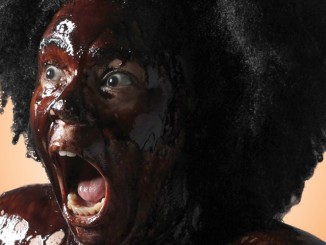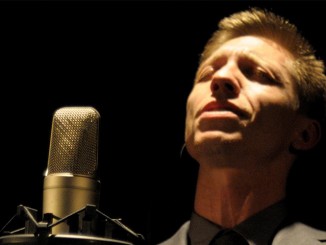
[Beauty and Terror]
It’s nearly impossible to watch Oedipus without already knowing what happens. Even those who haven’t read it know how it goes, its mythology so ingrained in our pop culture, though it’s usually remembered for its outcome and ending more than for its actual plot. Less a story of incest, this is the story of a King who attempts to find the murderer of his predecessor. But with the audience’s prior knowledge of the ending, the main challenge to any theatremakers tackling Sophocles’ Oedipus Rex is how to surprise us.
The Chorus; Oedipus might be a South Korean production retelling of the famous tragedy, but those expecting an Asian spin to the story might be somewhat disappointed. The content does have some resonance to East Asian cultural ideals though. The idea of the individual versus the group is beautiful conveyed through the contrast of Oedipus and the chorus. Ideas and values pertaining to losing or saving face seem to lie under the skin of the central characters too. But this is, ultimately, a text that serves Sophocles and his story above all else.
By choosing to alter very little of the actual story, retaining the original setting and overall structure, playwright Areum Han places her trust in the original text, deepening and highlighting preexisting ideas rather than adding her own. When most expectations are to give a modern twist to the classics, Han insists on being reverential. Instead of changing or shifting what the story is about, she and director Jae-Hyung Seo change the way it’s told, primarily through movement and music.
But this isn’t Oedipus the Musical. While having a strong tie to contemporary dance and opera at times, The Chorus is a unique beast. What is usually an antiquated device – the Chorus driving the story – is given new life. Made up of over a dozen performers, their presence is incredibly fluid as they switch from playing central characters, citizens of the city, narrators, playing piano and making sound effects. There’s never a sense of any one slipping into the background or just filling in a spot. You only have to look at any one of their faces to get a sense of where the story is, their skin painted with anguish and suffering. The ensemble work is simply outstanding, this tragedy belonging to them as much as Oedipus.
Kang Hee Yim who also doubles as Oedipus’ wife Jocasta gives an incredible performance in a usually perfunctory role. Despite lacking any standard character development, her predicament as mother and lover is conveyed with a sense of powerful ambiguity and self-denial. Then, of course, there’s Yoon Ho Nam’s towering, physical performance as King Oedipus that anchors the entire show. He is the very definition of blood, sweat and tears here, giving us the full gamut of emotional extremity. The only issue here is that the character and his situation is so removed from contemporary concerns that his struggle generates sympathy rather than empathy.
The pain and darkness of the story is a stark contrast to the beauty and lightness of the costumes by Ji Yeon Kim which consists of little more than a simple white garbs, uniform amongst the whole cast. The set is similarly simplistic but no less beautiful, as a circular wooden platform. Behind this space are three pianos (not to mention a fourth piano hidden to the side) that the Chorus sit beside when not physically required on stage. Rather representing a fixed location, the space also breaks up the traditional unities of space and time, allowing the action to blur more freely, as Oedipus himself changes locations and experiences flashbacks. While there’s a lot happening at all times in the production, the staging itself is actually rather minimalist, the bodies of the performers and chairs being the main fixtures moving on and off.
The choreography by Eun-Jung Jang, music composition by Uzong Choe and sound design by Bum Hun Lee are essential too, every element in perfect harmony with the script. Every visual, sound or movement reflecting a specific idea and bringing it to life. One of the most striking moments involves crows, manifested merely by the gesture of the chorus’ hands and a vocal screeching. There’s also the simplicity of Oedipus’ repeated strides, as if dragged down by quicksand. All this is elevated by the tremendous piano score that serves as a relentlessly urgent soundtrack to the action of the play, elevating it from simplistic to epic. Even while we may not understand the nuances of what is being spoken and sung at all times because of the language barrier, the feeling behind the words is always clear. What we lose in not being able to understand the text is more than salvaged by the universality of the music. The projected surtitles become something the audience refers to rather than relies on.
To put it bluntly, this is, on a technical level, a flawless production. The only minor niggle being the coda, which feels drawn out too long, and perhaps gives the audience too much room to breathe, the brutal catharsis of the play interrupted.
What becomes very clear is that the true tragedy of the Oedipus myth isn’t that he inadvertently kills his father and sleeps with his mother, or that he becomes the investigator of his own crime. No, as awful as those events are, the real tragedy is that he never had any choice in the matter. In the world of the Ancient Greeks, mankind is reduced to nothing but pawns in the face of the Gods. These moments are where this production excels, reveling in the inevitably of what is about to happen, forcing the audience to sit back and watch a slow-motion car crash.
By choosing to ground it in the classical setting, it sometimes sits awkwardly on the line between being a beautiful museum artifact and something designed for modern audiences. In spite of this, there’s no denying the originality and uniqueness of The Chorus. If the show occasionally feels like a spectacle above all else, then what a fine spectacle it is. The fact it is able to evoke a sense of what it might have been like to watch Oedipus for the first time on the Athenian stage is a remarkable achievement. This is world-class Greek tragedy like you’ve never seen before.
The Chorus; Oedipus is presented by LG Arts Center and Theater Company Juk-Dal and plays at Q until 20 March. Details see Auckland Arts Festival.
SEE ALSO: Theatreview.org.nz review by Vanessa Byrnes and Metro Magazine review by James Wenley




Leave a Reply